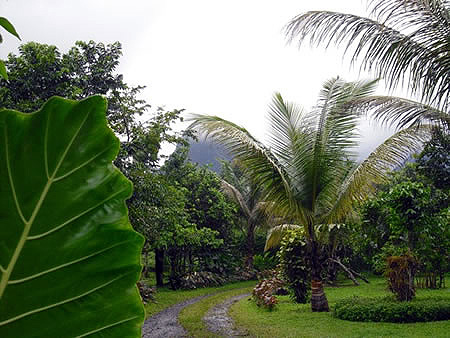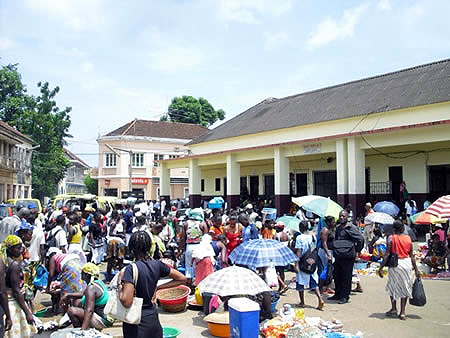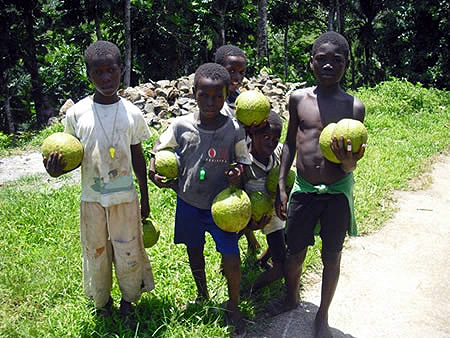China's in São Tomé in West Africa
Article and photos by Chaney Kwak

Having my hand drenched in palm oil and scorched over an open flame wasn't my idea of a perfect tropical getaway, but that's what I found myself doing on my last day in São Tomé.
A tiny equatorial nation of two islands and 220,000 people, São Tomé Principe floats in the Gulf of Guinea in West Africa.It's blessed with abundant fish, fruits, plants — and sea urchins, as I discovered on a deceptively tranquil beach. After a clumsy fall in the shallow water, I ended up with my right hand full of brittle black needles.
"Do you want to try the local cure?" the white-haired Portuguese doctor asked, giving up after fiddling with a hypodermic needle and tweezers for a half hour. He'd extracted some of the spikes, but most were buried deep in the skin of my hand, which was starting to resemble a baby blowfish. "Ask your friend’s housekeeper.”
******
I was in São Tomé to visit a friend who worked for an international NGO. To help her get acclimated, her employer hired a young housekeeper to look after her.
I’d come to admire and fear the housekeeper, a fierce twenty-two-year-old named Nina. Speaking when she absolutely needed to, she intimidated me with her silence. I did manage to make her laugh when I attempted to speak Portuguese, but I was never quite sure what she was thinking between those bouts of laughter.
“A tourist is an ugly human being,” Jamaica Kincaid writes in A Small Place. In her passionate diatribe against neocolonialism in her native Antigua, Kincaid exposes tourists’ intrinsic roles as intruders and exploiters. It isn’t hard to draw many parallels between Antigua and São Tomé: both are small, sunny nations created by European colonialism and are still economically dependent on their former masters decades after liberation.
With Nina, my intruder status was made painfully obvious. I was taking advantage of her services for my cultural authenticity (like her cooking of cassava leaves and barracuda), constantly getting in her way as she tried to go about her day. In her presence, I felt like an unwanted exchange student.
******
I walked to my friend’s house from the doctor’s office, imagining how I would approach Nina for help. Was I imposing myself on her? Would I come across as an indulgent hobbyist, not unlike a perfectly healthy tourist tracking down an esoteric healer in the Himalayas? In truth, I just wanted the needles out, traditionally or otherwise.
When I reached home, Nina got out of the motorcycle taxi with bags full of the day's purchases. I smiled sheepishly and pointed at my throbbing hand. Nonchalantly, she pulled open the bandage and then broke into a giggle. "Vim," she said, “come.”
She took out a plastic Sangres beer bottle from the kitchen cabinet crowned with a makeshift cork woven out of palm leaves. She popped open the bottle and doused her index finger with the palm oil, whose scarlet hue and chunky consistency reminded me of Vietnamese chili sauce. Before I could utter "hand sanitizer," or "soap," Nina rubbed her oily finger on my wounds. My face must have given away my distress because she cooed a few things to comfort me. The little Portuguese I knew did not overlap with any of the words she used until she said one thing she knew I’d understand: "Leve-leve."
******
My friend had told me that "leve-leve," literally "slow-slow," was the de facto national motto. So many people I encountered seemed to use the phrase liberally — drivers, waitpersons, schoolchildren, airport staff tracking my lost suitcase, and even the prison guards who turned me away when I accidentally walked up to the jail gate.
Leve-leve means anything between "slow down" to "take it easy." It's a cliché to describe the heat when you write about a tropical place, but in São Tomé it felt as if a wave of hot humidity hung in the air, impeding my every step. Navigating the sun-drenched streets of the city was more like wading than walking. I had no choice but to slow down and take it easy.
And at that moment, as Nina applied palm oil on my hand, what could I do but let go? She was my last resort.
Then she turned on the gas stove.
“Que você…” My Portuguese faltered. I swallowed hard and asked in English, “What are you doing?”
Without an answer, Nina led my hand closer to the fire. I knew what was about to happen: I would run around like a klutzy cartoon character, madly waving my flame-engulfed hand. I tried to pull away, but Nina’s biceps tightened. She meant business. I had to suspend my disbelief.
Disbelief was a common thread throughout my stay. At 370 square miles, the island nation is more petite than Hong Kong. Despite its size, the place never felt small. The azure horizon, punctuated by palm trees, stretched to no end; the skies remained broad open day and night, and the impenetrable rain forest in the interior was folded as if guarding a dense riddle within.
******
Very few times did I see a sizeable crowd. At the airport, hoards of relatives welcoming back their children wept on the tarmac; vendors and shoppers gathered around the crumbling market hall in the city center. Otherwise, I would look around and find very few people to fill those stretches of open space.

Just a week before, I had arrived on an air-conditioned plane that traversed halfway down Africa in hours. Yet, life was happening on the ground at an entirely different speed. The unpaved roads kept unfurling themselves, making the thirty-some miles to the island's southern tip a three-hour journey. São Tomé was a small place with an unfamiliar vastness that I struggled to take in.
******
On foot, the distance stretched even farther. Once, in a small town called São João dos Angolares, I took a foolhardy stroll at noon. I had barely walked five minutes before sunblock ran down my face like bad stage makeup. I was hoping to take a quick dip, but now I wasn’t sure if I was going to make it down to the riverbank—or, more importantly, back up the hill.
“Branco,” I heard kids yell. A dozen youngsters between ten and fifteen were hanging out in the shade about a hundred yards ahead. It took me a few more steps before I remembered the word from my Portuguese class — “white.” From a distance, my Northern Europe-induced pallor must have misled them.
As I came nearer, the kids quieted down, confused. Then, as if orchestrated by a conductor, they began chanting in unison: “Chinês, Chinês, Chinês!”
I was accustomed to such assumptions. In souks of Turkey and Jordan, shopkeepers routinely hiss “Irasaimasen, Japan!” at me. In India, persistent souvenir hawkers followed me as they interrogated, “China? Japan? Philippines? No? Thailand?” Even in Germany, where I had lived for five years, I still had strangers walk up to me at parties and greet me with “nihao,” eager to show off their rudimentary Chinese. Throughout my travels, I had been a reluctant cultural ambassador for various Asian countries that had nothing to do with my real identity.
In São Tomé, too, I’d heard “Chinês” before. Back in the capital city, faint variations of ching-chang-chong, ring-a-ting-tong would trail me as I sauntered by a schoolyard. Here in São João dos Angolares, however, this was the only sound I heard. I was a one-man freak show parade.
I wasn’t surprised that the kids were chanting “Chinese” at me. What confused me was the volume. The kids were practically screaming, and their chorus grew louder with each step I took.
When I scanned the kids ' faces, I sensed no hostility or maliciousness. They were entertaining themselves all right, but I realized they were also trying to amuse me.
Surely, they had seen Asians before. The government of São Tomé made a strategic decision to recognize Taiwan as a sovereign nation—something most trade-happy countries are too scared to do, in fear of angering Mainland China. Today, only a handful of small countries like Belize and Palau maintain diplomatic ties with Taiwan, which even the United Nations has shunned.
São Tomé’s loyalty has not gone unnoticed. The government of Taiwan has sent aid money and medical staff to its fellow island nation. It could credit itself for helping eradicate Yellow Fever there. (Oh, the irony!)
When the airport’s sole runway was damaged, neither the local nor the Portuguese government stepped in. Taiwan paid for a brand-new tarmac to continue the weekly flight to Lisbon.
Taiwan’s health workers regularly travel around the island, vaccinating, fumigating, and providing medical care in all the small towns. Taiwanese doctors must have been walking down the very same path before me, perhaps even graciously accepting the chants of “Chinese” like a hero’s welcome.
******
On the other hand, I did not care for the false designation. I was merely resigned.
The kids kept shouting “Chinês, Chinês!” as a new fraction broke off… I couldn’t ignore them anymore and stopped in front of them.”
“Bom dia,” I said to no one in particular, triggering an avalanche of questions. I could only make out odd words here and there: what, doctor, from, where, friend, like, want, why?
I’d read that some tourists thought it would be a blast to throw candy out the window as they drove around the island. Since then, foreigners have been equated with gullible candy dispensers. A few times, I’d been asked for sweets — even from grown-ups. As the kids said “doces,” or sweets, I hoped they were above such mundane assumptions. Surely, these street-smart children must have understood that someone on foot would not be so idiotic as to carry candy bars in that heat.
Suddenly, a tall girl with arms akimbo pushed forward. Behind her, a posse of four timid girls looked at their leader with pride. She must have been the alpha mean girl — some things are universal.
“Where are you from?” I understood her say.
The heat was getting to me. I helplessly spun a story that made no sense, uttering seemingly meaningless names like Seattle, Korea, Washington DC… I wasn’t getting anywhere. “Berlim, Alemanha,” I finally told her.
She looked puzzled. Then, she turned to her gang and declared, “São Paulo.”
“São Paulo, Brazil?” I repeated incredulously.
The girl cocked her head at her minions as if to say, “See what I told you?”
When traveling in Brazil, quite a few people assumed I was a Paulista. As most of Brazil’s three and a half million East Asians live in São Paulo, an Asian face seemed to be associated with the international metropolis. Even in the outer fringes of the central state of Minas Gerais, friendly bus passengers and fellow diners would ask me about life in São Paulo.
Where did the bossy girl learn about Asian Brazilians? How did lives in opposite corners of the Lusophonic world connect?
“Televisão?” I asked her. It only confused her more and seemed to make her cling to her conviction that I was a Brazilian with the cognitive skills of a two-year-old.
In Sweetness and Blood: How Surfing Spread from Hawaii and California to the Rest of the World, with Some Unexpected Results, author Michael Scott Moore describes how American surfers traveled to São Tomé in 2000, eager to spread surfing to a virgin territory. They found, however, a thriving native surfing culture. In turn, the Sao Tomean surfers were surprised to hear that others in the world rode waves. Isolated by the ocean surrounding them, they didn’t know that surfing was a global, multi-billion dollar industry. Such a tale sounds improbable to most of us in the Western world who live chained to our information devices. But the internet was unheard of in many parts of São Tomé, and television was a rarity. In fact, many towns lacked electricity, especially in places populated by the Angolares.
The Angolares, an ethnic minority, are something of a myth. Reputed (and disputed) to be descendants of rebellious enslaved Angolans shipwrecked in 1540, they remained separate from the rest of the island until the last century, developing their own creole and living from the fishery in the sea. Even today, many live cut off from the rest of the island, which is relatively isolated.
However, São João, the central economic hub of the Angolares, wasn’t really remote by Sao Tomean standards. There was a bar, kiosks, and a public water pump in the town square. A mural on a three-story building depicted an inexplicable tree of condoms, urging folks to protect themselves. There was also a former plantation, now a tourist hotel with a chef who is even famous in Portugal — in other words, the town must have experienced its share of the outside world, even if most tourists drove past the clutters of shacks that made up the town.
As best as I could, I asked the girl if she was Angolar herself and whether she’d seen people who looked like me in Brazilian telenovelas. But she had lost interest in me by then and was strutting away, leading her followers.
With the crowd quickly dissipating, I resumed my walk downhill. Women laid out the clothes they'd just washed on a pebble road next to a quiet stream. They eyed me with suspicion, as mothers instinctively do around strangers. Waiting for their laundry to be finished, children ran around naked, too absorbed in their game to notice me. I was no longer an attraction. Life was unfolding as I understood it.
My nape prickled in the harsh sun. I decided to abandon my plans and turned around. That’s when I realized five little boys had been quietly following me. It hurt when I smiled — that’s how sunburned I was getting.
They couldn’t have been older than ten. They were all carrying breadfruit, a staple food that grows everywhere on the island. When the green fruit becomes edible, it literally drops from the sky. A quick roasting turns it into an aromatic starch that tastes like freshly baked bread.

One of the kids patted my pocket, where my camera was, and gestured to take a picture. I didn't want to play the anthropologist eager to chronicle the natives, but the kid seemed shutter happy, like my five-year-old niece posing in front of the Christmas tree. "Queres?" I asked him (which I thought meant "Do you want," although my conjugation-happy Portuguese teacher might have scolded me for this). I asked over and over. Each time, they all nodded, growing a little impatient.
I turned on my old digital camera. The kids lined up and stared at it. The youngest kid goofed off, and another proudly showed off his breadfruit. The other three kids just looked on. There wasn't the kind of wide-open, grateful grin that a tourist might hope for to smooth out the creases of his own conscience. It was more complicated than that. Their expressions were a concoction of different ingredients: part shyness, part solemnity, part suspicion, part incredulity. What were these Chinês doing in their village, idling alone on the path they used for work?
Had they asked, I couldn’t have answered.
After taking a hasty photograph, I handed over the camera. They passed it around with a good deal of excitement. Shedding the reserve they’d just worn, they pointed at themselves on the cracked LCD screen, laughed, examined the picture, and made jokes about one another’s appearance.
Months later, I would finally print the photograph and mail it to São João. As I had no address or name, I would address it to The School, hoping a teacher might recognize one of the children. The envelope would not return to Berlin, and I would try to convince myself that the picture must have found its way to its rightful owners. But I did not know this at that moment. Instead, I stood in the sun with them, passing the camera back and forth, laughing with them, grateful that I was not just a spectacle or an interloper, at least for that fleeting moment.
******
I wasn’t close to laughing as Nina pulled my oily hand closer to the flame. A droplet of the palm grease sizzled as it dripped on the stovetop.
Nina moved my hand over the fire, like a kid on a dare hovering her finger across a candle flame. My hand did not catch on fire or hurt any more than it already was. The oil turned angry red in the heat. “Leve-leve,” I said aloud. She repeated it like a stern schoolmarm, pleased that her pupil was finally learning. “Leve-leve.”
Later that night, my friend took me to a bar where all the NGO workers in the city congregate night after night. At the next table over, a San Tomean teenager was using the bar’s WiFi to get on Facebook; a group of local dandies, decked out in suits, were drinking from a liquor bottle. Dozens of young professionals from Europe were socializing in French, English, and Portuguese. I knew I was in Africa, but this could have been Geneva. Struck by this sudden familiarity, I looked at my bandaged hand, horrified. I couldn’t believe that I’d let Nina roast my hand. I yanked the bandage open, ready to find a disfigured stump. Instead, I saw my own hand, no longer swollen. The black sea urchin spines had begun poking out, and I could pull them out painlessly.
Chaney Kwak is a translator and freelance writer based in Germany.
|
